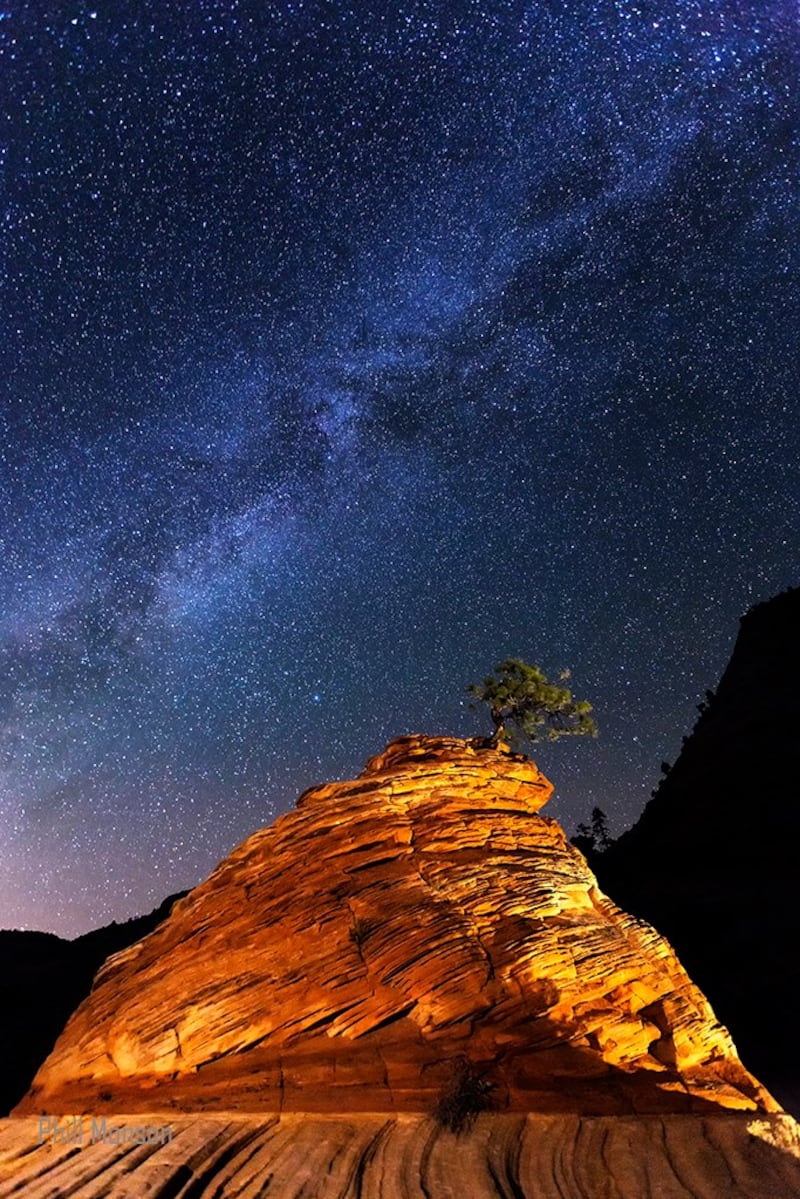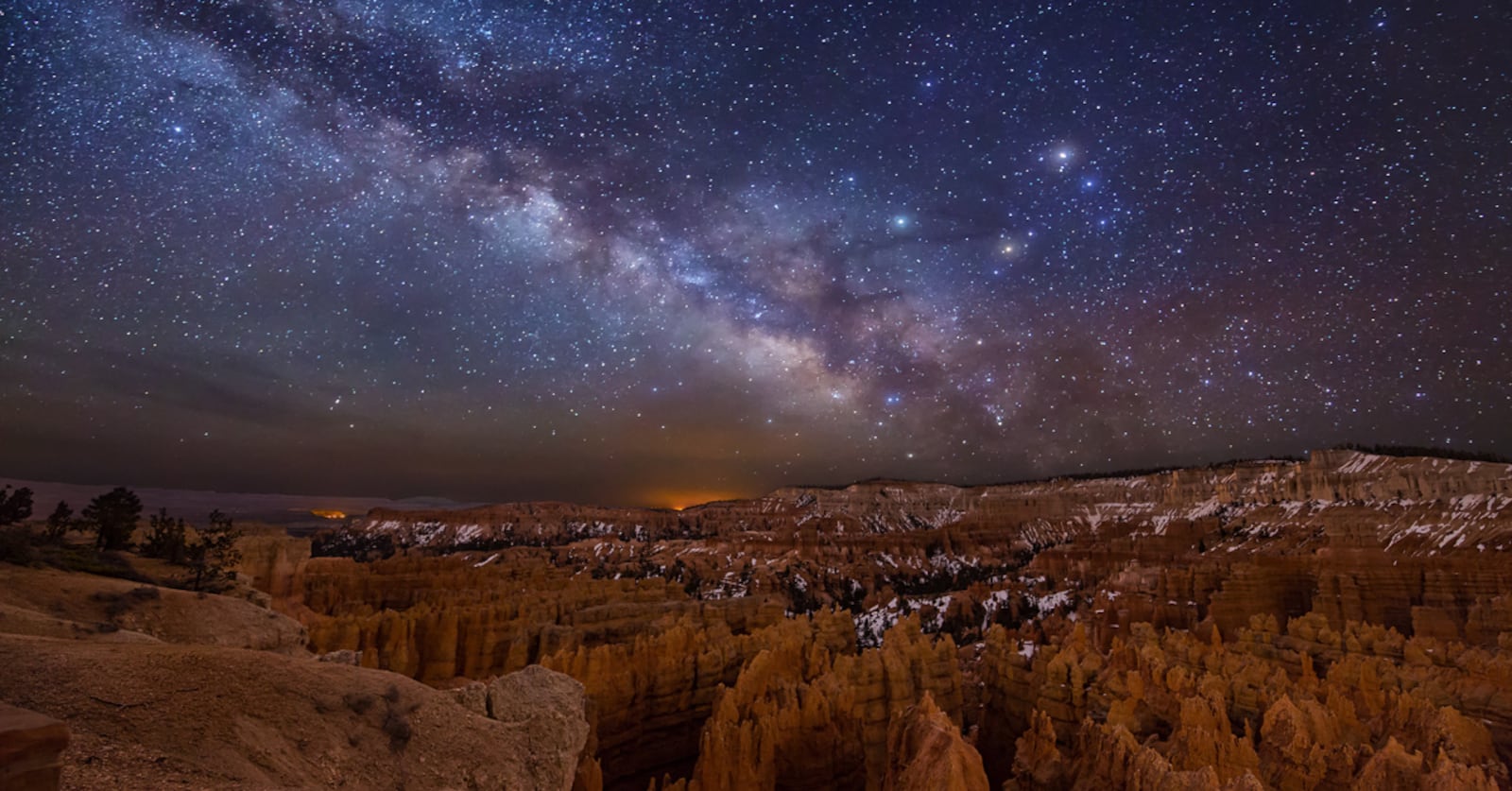Springdale sparkles a bit more today — or, rather, at night — since the town earned its Dark Sky Places designation in 2023 from the International Dark Sky Places (IDSP) program by minimizing its outdoor light pollution.
While it’s too early to gather and analyze economic data about how astrotourism has impacted communities such as Springdale, dark sky culture has the potential to make its way around the state and create economic opportunity.
How Springdale became a Dark Sky Community
Tom Dansie, Springdale’s director of community development, says the town was already doing much of the work to regulate its outdoor lighting. After reviewing the main road that runs through Springdale, the town retrofitted the 1980s vintage street lights lining the street.
From there, it was easy to kick around the idea of earning the prestigious Dark Sky Places designation. Today, the light is more appropriately shielded, facing downward and emitting the required warm color temperature to support the internationally known initiative.
The process took more than three years from start to finish. And on July 20, 2023 — the anniversary of humankind landing on the moon — Springdale became the third town in Utah to be honored (Torrey and Helper also claim the Dark Sky Community designation). Utah leads out with the highest concentration of places to have earned this certification.
What is light pollution?
Light pollution comes from artificial lights switched on after the sun has gone down. Not all outdoor lighting has a function. Landscape lights, for example, light up the sides of buildings and don’t provide much function, yet the light scatters into the night sky and diminishes the night view.
While artificial light helps keep roads and sidewalks safe in the evening and supports city nightlife, its sheer volume has impacted how well people can naturally see and experience the night sky. Retrofitting city lights to minimize light pollution retains these safety and recreation benefits while protecting local night skies.

Dark skies brighten economic outlook
Utah is starting to collect anecdotal evidence that people respond to astrotourism, which is when people visit a place to experience the night sky. While the current stories don’t offer hard data yet, Utah can learn from night sky data in other states and hope for similar economic outcomes.
The Colorado Plateau Dark Sky Cooperative highlights three major economic changes that can happen to Dark Sky designation areas. One, property values can increase. According to the report, a 2017 home value from one of Colorado’s dark sky preservation communities was higher than homes in Denver, weighing in at almost double the median value.
The second economic change happens through reduced energy waste. About 30 percent of the artificial light that comes on at night is wasted, according to the International Dark-Sky Association (IDA). This means an unnecessary 21 million tons of carbon dioxide gets released into the atmosphere each year and wastes billions of dollars. This global issue has increased with economic growth, with about 99 percent of the nation living with night pollution. On a local scale, implementing better lighting measures will reduce a public utility’s bottom line and improve the area’s well-being. This impact goes beyond saved dollars and energy as Dansie says artificial light at night can contribute to poor health outcomes, such as being linked to certain types of cancers.
And third, dark sky areas could see a rise in astrotourism and a positive impact on the local economy. This new type of “low impact” tourism can boost local revenue because astrotourists visit locations at night. This means they’ll spend more money on accomodations and meals than people who visit an area only during daylight hours. In Colorado, this has averaged out to about three times more spending than daylight visitors.
According to the report, Colorado could see a $5.8 billion increase in tourism spending over the next 10 years while creating more than 10,000 jobs each year. While Springdale is fairly new to astrotourism, Utah has helped lead this industry by hosting more than 5.5 million visitors in 2016 at International Dark Sky parks across the state. Zion National Park and Springdale benefit from this tourism since they’re located next to each other, and both have the Dark Sky designation. Visitors can even register for star parties or tours to enjoy the pristine view.
StarGazing Zion is a local astrotourism business that takes visitors near Zion National Park on a tour to experience the sky. The business, which started in 2021, has grown steadily over the past three years. Matthias Schmitt, head astronomy guide, says the two-hour program focuses not just on the night sky, but also on the science and how it works.
“When they experience the night sky in its splendor, they leave with a sense of awe and inspiration,” Schmitt says.
StarGazing Zion and the local astrotourism industry isn’t siloed in their success either. On average, StarGazing Zion visitors stay one to two nights longer in the area to participate in stargazing activities.
Dark Sky designations benefit the community
Along with economic development, the Dark Sky designation creates a connective element that speaks to community pride and taking in a new experience.
Jack Burns, Springdale Town Council member, says the Dark Sky designation makes Springdale unique. “If you have never experienced a night sky, it’s certainly part of the brand for Springdale,” Burns says. He sees it as a valuable asset that needs to be protected.
“When you drive through Springdale at night, that’s when you see the fruit of our labor,” Dansie says. “I’m pretty proud of everything the town has accomplished to date and the commitment we’ve seen from residents and businesses to work with the town.”
Serena Wurmser, Night Sky assistant at Zion, says national parks and their surrounding communities are some of the last places to see darkness in such a light-polluted world — and they deserve protection.
The majority of Americans can’t see the Milky Way at night from where they live. Wurmser gets to show tourists this view firsthand. Millions of people have visited the southern Utah area, and for many, Zion and its neighboring communities are the first places they have ever seen a naturally dark night sky.
“It is not uncommon for people who have never seen the Milky Way before to tear up and to stay out for hours after their first sight, simply to take it all in,” Wurmser says. “No matter who people are or where they are from, the first sight of a truly dark night sky sparks a feeling of wonder.”
Whether it’s more community pride or eventual economic growth, there’s enough of a reason to get the designation. Dansie says going through the process to become certified validated all the efforts the town has made to protect the sky for many years.
“This project further encourages and sends the message that this is serious to us, we really value this, it’s important, and we want to set an example and spread the message that dark skies are important,” Dansie says. “We hope education spreads to our neighboring communities and they, too, catch the vision of dark skies.”

